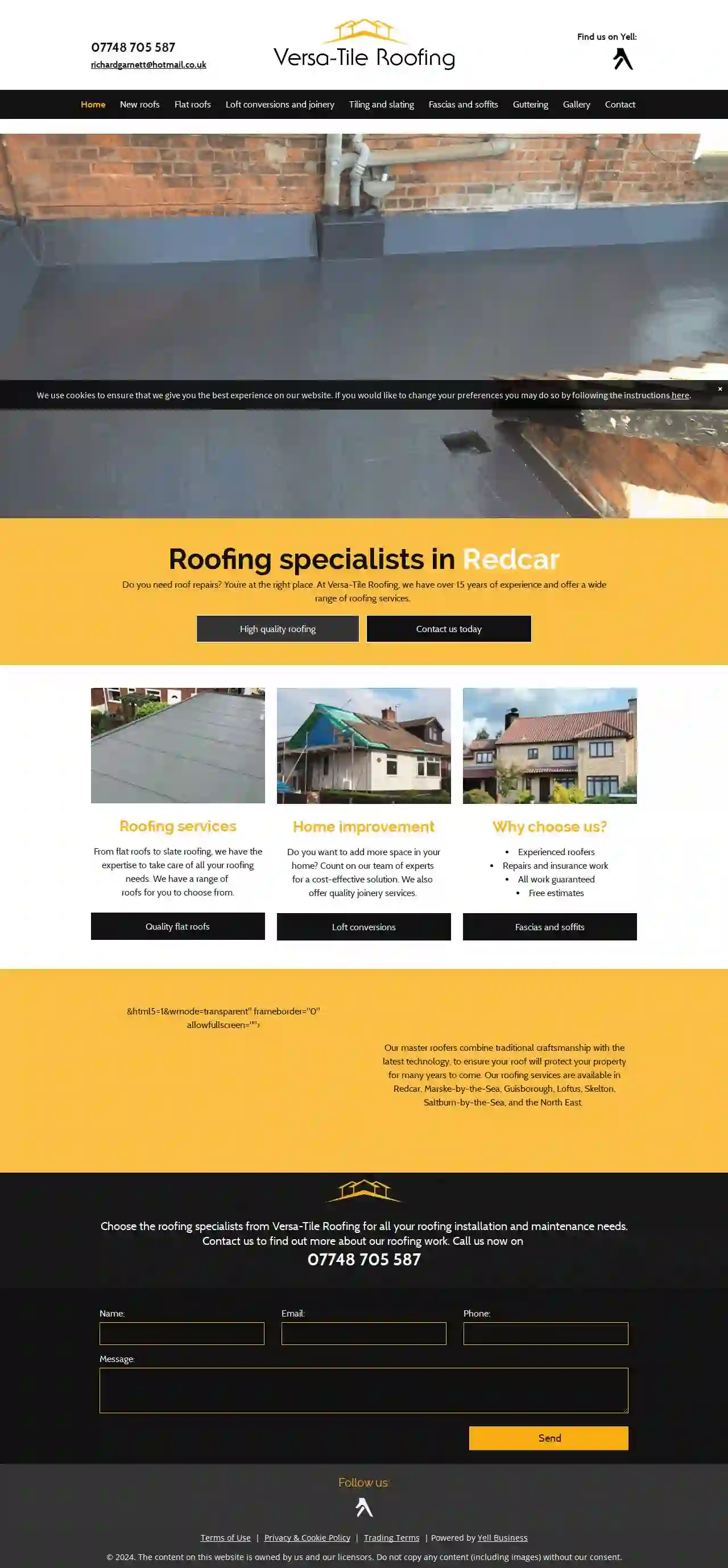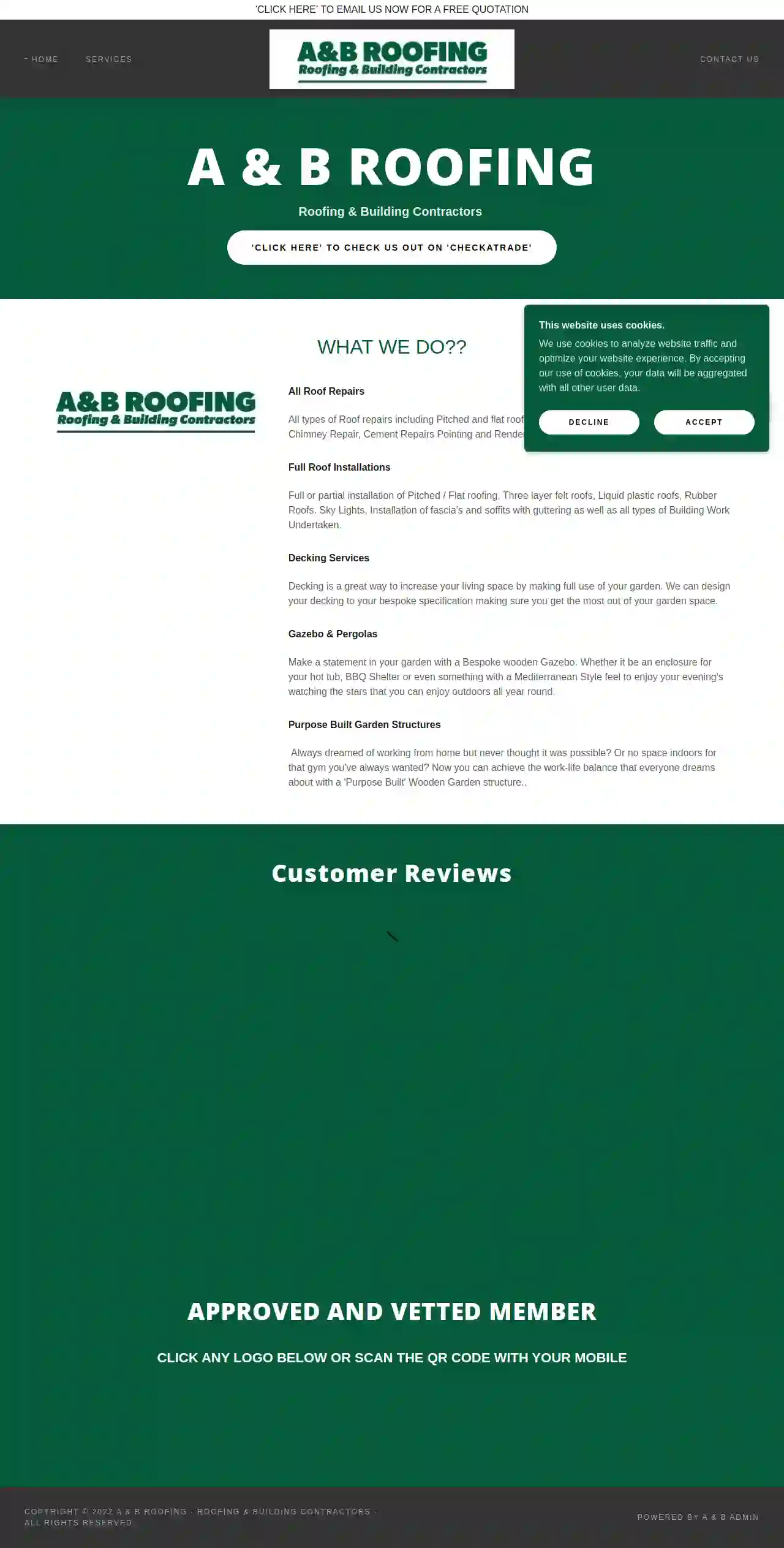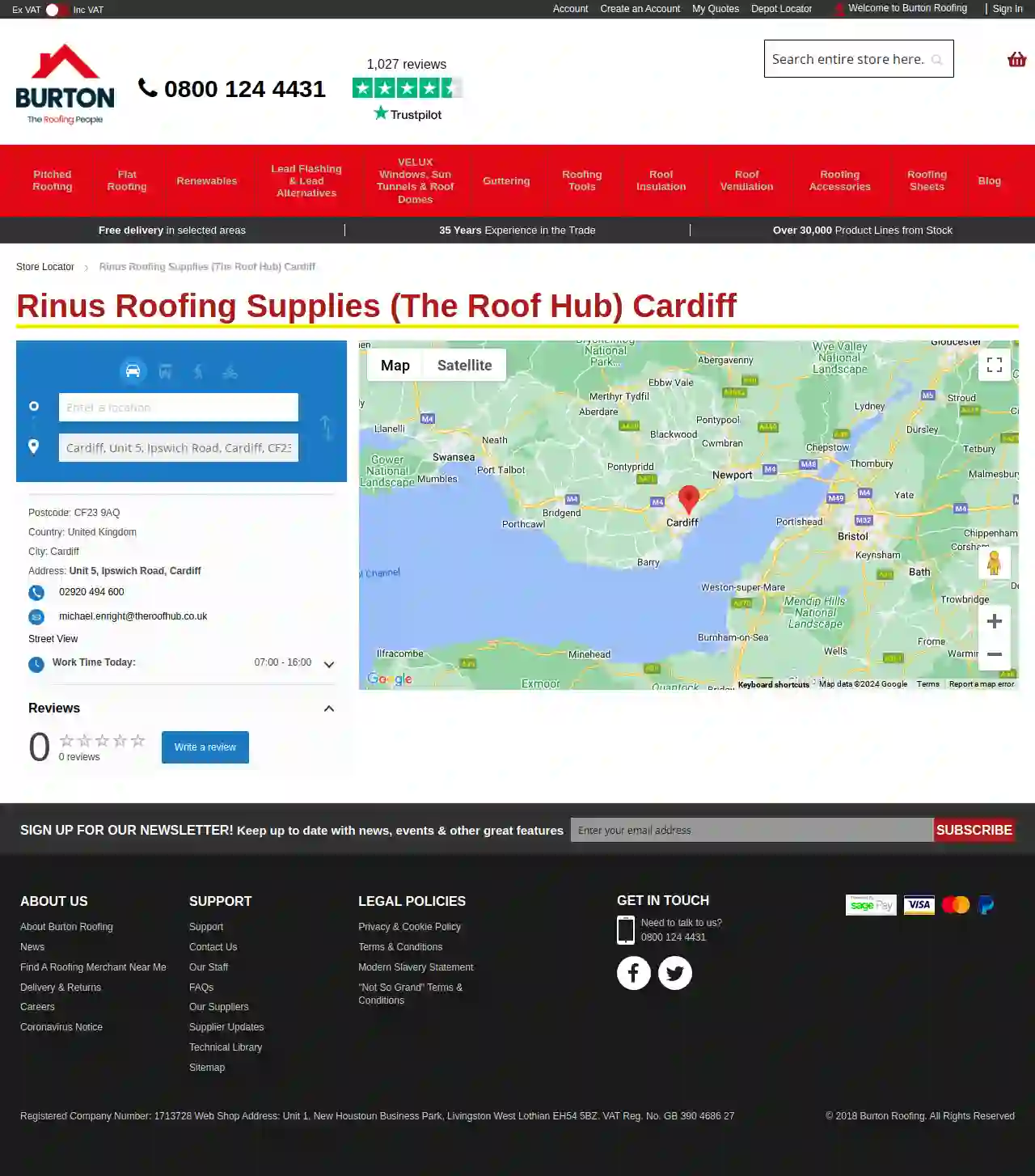Roofing Companies Yarm
Top 10 Roofing Service in Yarm
Receive up to 3 Roofing Company quotes for your project today! Compare profiles, reviews, accreditations, portfolio, etc... and choose the best deal.

Bralton Roofing
511 reviews12 Harris Avenue, Rumney, CF3 1QE, GBAt Bralton Roofing, we are a multi-disciplinary residential roofing contractor serving Cardiff and South Wales. We specialize in traditional pitched slate and tiled roofs, offering individually tailored roof installation and repair services. Our team of experts provides a comprehensive range of services, including roof window installation, roof ventilation installation, roof waterproofing, roof structure repair, gutter installation, chimney services, and roof design. We pride ourselves on delivering high-quality workmanship, using certified and quality roofing materials, and ensuring labour quality assurance according to BS5534. We are committed to providing a hassle-free and stress-free experience for our customers, with a focus on clear communication, effective material and labour management, and a collaborative planning process. We believe in delivering excellence in everything we do, and our team is dedicated to exceeding your expectations.
- Services
- Why Us?
- Gallery
Get Quote
Versa Tile Roofing
55 reviews29 Ryehills Drive, Marske-by-the-Sea, TS11 7DN, GBAt Versa-Tile Roofing, we are a team of experienced roofers with over 15 years of experience serving the Redcar area and surrounding towns. We offer a wide range of roofing services, from flat roofs to slate roofing, ensuring we can meet all your roofing needs. Our commitment is to provide high-quality roofing solutions that are both durable and aesthetically pleasing. We pride ourselves on combining traditional craftsmanship with the latest technology to deliver exceptional results. Whether you require roof repairs, new installations, or maintenance, our team of master roofers is here to help. We are dedicated to providing a reliable and cost-effective service, backed by free estimates and all work guaranteed. We serve Redcar, Marske-by-the-Sea, Guisborough, Loftus, Skelton, Saltburn-by-the-Sea, and the wider North East region. Contact us today to discuss your roofing project and let Versa-Tile Roofing be your trusted partner for all your roofing needs.
- Services
- Why Us?
- Gallery
Get Quote
A & B Roofing - Roofing & Building Contractors
3.73 reviewsEast Back Parade, Sunderland, SR2 8NX, GBA & B Roofing is a trusted roofing and building contractor based in Sunderland, Tyne & Wear. We are dedicated to providing exceptional customer service and delivering high-quality roofing solutions for all your needs. Whether you require new roof installations, repairs, or bespoke garden structures, our team of experienced professionals is here to help. We pride ourselves on our commitment to excellence, using the highest quality materials and equipment to ensure lasting results. Our fully insured status provides you with peace of mind, knowing that your project is in safe hands. At A & B Roofing, we understand that your home is your sanctuary. That's why we strive to exceed your expectations by offering personalized solutions tailored to your specific requirements. From full roof installations to intricate repairs, we handle every project with meticulous attention to detail. We also specialize in creating bespoke garden structures, including decking, gazebos, and pergolas, to enhance your outdoor living space. Our team will work closely with you to design and build a structure that perfectly complements your home and lifestyle. Contact us today for a free quote and experience the A & B Roofing difference.
- Services
- Why Us?
- Gallery
Get Quote
Horizon roofing ne ltd
510 reviewsDurham, GBHorizon Roofing NE LTD is a family-run business with 20 years of experience in providing professional roofing services to both domestic and commercial clients. We cover Durham, High Etherley, Etherley, Witton Le Wear, Low Etherley, Hunwick, Crook, West Auckland, Fir Tree, Crook And Willington, Hamsterley, Evenwood, Bishop Auckland and Surrounding Areas. We offer a full range of roofing services, from small simple repairs to ongoing contracts, and have a great reputation in the commercial sector as well as with homeowners.
- Services
- Why Us?
- Accreditations
- Our Team
- Testimonials
- Gallery
Get Quote- SK
SKN Building & Roofing Services
513 reviews1000 King St, Kitchener, N0L 1P0, GB- Services
- Why Us?
- Gallery
Get Quote 
I R & D Ferguson Roofing
52 reviews49 Collin Ave, Middlesbrough, TS4 3HH, GBWe are a local family-run business that has specialised in the roofing industry for over 30 years. We aim to provide the best possible service for repair and installation work throughout the North East of England. With our high expertise and knowledge in the area our fully trained team can get your roof done right, just the way you want it! Save money on your heating and energy bills in future by getting your roof built the right way by us. At I.R.&D Ferguson Roofing & Rooflines, we have many services for your needs. If you're looking for a roofer Middlesbrough we provide roofing services throughout the North East and we aim to provide the best possible service for repair and installation work.
- Services
- Why Us?
- Accreditations
- Our Team
- Testimonials
- Gallery
Get Quote
Practical Roofing
Darlington, GBThis domain has recently been registered with Namecheap.martinsroofing.shop Diese Webseite wurde vom Domain Inhaber dynamisch generiert, der das Sedo Domain Parking Programm nutzt. Die auf dieser Seite automatisiert bereitgestellten Werbeanzeigen kommen von dritter Seite und stehen mit Domain-Inhaber oder Sedo in keiner Beziehung. Privacy Policy
- Services
- Why Us?
- Gallery
Get Quote
The Roof Hub Cardiff
4.920 reviewsUnit 5, Ipswich Road, Cardiff, CF23 9AQ, GBBurton Roofing Merchants: Supplying roofing materials to the nation for over 40 years. With over £8million of high-quality roofing products available on the ground and ready for delivery, you can count on Burton Roofing Merchants to have what you need at the right price. Burton Roofing - A brand you can trust.
- Services
- Why Us?
- Gallery
Get Quote
Enhance roofing and building
4.627 reviewsSunderland, GB- Services
- Why Us?
- Gallery
Get Quote
KJ roofing sunderland
51 reviews18 Brockenhurst Drive, Sunderland, SR4 9NT, GBKJ Roofing are roofers offering new roofs & roof repairs to clients across Sunderland, Houghton Le Spring, Seaham, South Shields, Jarrow, Hebburn, Boldon, Peterlee, Durham, Chester Le Street. Roofers all over Barnes Park, Grangetown, Seaburn, Whitburn, Southwick, Fulwell, Ryhope, Pennywell, Doxford Park Sunderland & more. Here at KJ Roofing Sunderland, we offer a wide range of roofing services to clients in Sunderland and across the North East. With 10 years of experience, we have the skills to take care of everything from new roof installations to roof repairs. We're fully insured, a trusted and reliable team and we always use premium roofing materials to ensure the work we carry out is going to last. Contact us today with your requirements for a free quote. Need A New Roof? Our roofing services include: Roofing Roof Repairs Fascias, soffits & gutters Velux Window Installers Roof installations The roof is one of the most vital components of your home or business. It protects the structure of the building itself, as well as the contents and its occupants from the elements and helps make it secure from intruders and vandals. A roof is a major investment, so it makes sense to invest in a high-quality roof that will stand the test of time, and we will manage the whole project from design to installation. When the time comes for a new roof, you want to know you are getting quality workmanship at a great price. We only use premium quality materials and pride ourselves on our friendly, approachable, and trustworthy team to get the job done on time and on budget. Roof maintenance It can be all too easy to neglect the maintenance of your roof. But if you don't keep your roof maintained it will cost you more later. Common issues that arise are: Leaves and debris collecting on the roof Check your gutters – these are vital to ensure that water and debris are carried away from your roof Trees and branches – make sure they can’t damage your home in a storm Moss and algae – this will build up on your roof, causing it to look unsightly and cause damage Roof repairs Over the years, our experience and technical know-how have led us to develop a wide range of roofing repairs and window installations. We repair all types of roofs from domestic to commercial. When we arrive to assess your roof, we take note of any potential issues so you can take preventative measures and prevent or reduce larger issues in the future. Our comprehensive range of roofing services mean that we can take care of your entire roofing system. Why choose us? Over 10 years' experience Free quotes Fully insured and reliable team Premium roofing materials What do our customers think? Very impressed, would recommend A lovely friend team of Roofers, always smiling, polite, reliable, and also a great job done too. Professional roofing service in all weathers Professional roofing service. They work in all weathers and are respectful to the property and the occupants. Do you need domestic and commercial roofing services? Contact KJ Roofing in Sunderland for high quality installations, maintenance and repairs.
- Services
- Why Us?
- Accreditations
- Our Team
- Testimonials
- Gallery
Get Quote
Over 12,314+ Roofing Companies registered
Our roofing pros operate in Yarm & beyond!
Roofyng.co.uk has curated and vetted the Best Roofing Contractors arround Yarm. Find a trustworthy contractor today.
Frequently Asked Questions About Roofing Companies
- Experience: Companies with a solid track record and years of experience in the industry.
- Licensing and Insurance: Verify they are properly licensed to operate in your area and carry adequate insurance to protect you from liability.
- Certifications: Look for certifications from reputable organizations, demonstrating expertise in specific roofing materials or techniques.
- Positive Reviews: Check online reviews and testimonials from previous customers.
- Professionalism: Choose a company that communicates clearly, provides detailed estimates, and has a courteous and responsive team.
- Roof size and complexity
- Roofing material chosen
- Local labor costs
- Accessibility of the roof
- Removal of existing roofing
- Additional features (skylights, chimneys, etc.)
- Style: Consider your home's architectural style and choose a roofing material that complements it.
- Climate: Factor in your local climate conditions. Some materials perform better in extreme heat, cold, or high winds than others.
- Budget: Roofing materials have a wide range of costs. Determine your budget and choose materials that fit your financial constraints.
- Durability and Lifespan: Assess the expected lifespan and durability of different materials.
- Energy Efficiency: Choose materials with good insulation and reflectivity properties to improve your home's energy efficiency.
- Asphalt Shingles: Popular, affordable, available in various styles (3-tab, architectural, etc.)
- Metal Roofing: Durable, long-lasting, energy-efficient, available in panels, shingles, or tiles.
- Tile Roofing: Clay, concrete, or slate; known for longevity, durability, and aesthetic appeal.
- Flat Roofing: EPDM rubber, TPO, PVC, modified bitumen, or built-up roofing (BUR).
- Slate: Natural stone, extremely durable, expensive, requires expert installation.
- Wood Shakes or Shingles: Natural wood, aesthetically pleasing, requires regular maintenance.
How do I find a good roofing company?
How much does a new roof cost in the UK?
How do I choose the right roofing materials for my home?
What are the different types of roofing materials?
How do I find a good roofing company?
- Experience: Companies with a solid track record and years of experience in the industry.
- Licensing and Insurance: Verify they are properly licensed to operate in your area and carry adequate insurance to protect you from liability.
- Certifications: Look for certifications from reputable organizations, demonstrating expertise in specific roofing materials or techniques.
- Positive Reviews: Check online reviews and testimonials from previous customers.
- Professionalism: Choose a company that communicates clearly, provides detailed estimates, and has a courteous and responsive team.
How much does a new roof cost in the UK?
- Roof size and complexity
- Roofing material chosen
- Local labor costs
- Accessibility of the roof
- Removal of existing roofing
- Additional features (skylights, chimneys, etc.)
How do I choose the right roofing materials for my home?
- Style: Consider your home's architectural style and choose a roofing material that complements it.
- Climate: Factor in your local climate conditions. Some materials perform better in extreme heat, cold, or high winds than others.
- Budget: Roofing materials have a wide range of costs. Determine your budget and choose materials that fit your financial constraints.
- Durability and Lifespan: Assess the expected lifespan and durability of different materials.
- Energy Efficiency: Choose materials with good insulation and reflectivity properties to improve your home's energy efficiency.
What are the different types of roofing materials?
- Asphalt Shingles: Popular, affordable, available in various styles (3-tab, architectural, etc.)
- Metal Roofing: Durable, long-lasting, energy-efficient, available in panels, shingles, or tiles.
- Tile Roofing: Clay, concrete, or slate; known for longevity, durability, and aesthetic appeal.
- Flat Roofing: EPDM rubber, TPO, PVC, modified bitumen, or built-up roofing (BUR).
- Slate: Natural stone, extremely durable, expensive, requires expert installation.
- Wood Shakes or Shingles: Natural wood, aesthetically pleasing, requires regular maintenance.